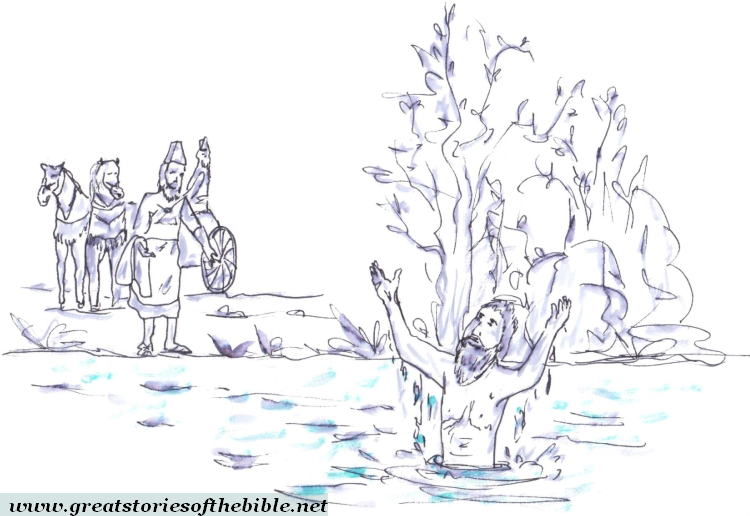Elisha - episode 1
Wash in the Jordan seven times
In this post we start to tell the ministry of Elisha, Elijah’s successor. Very soon he proves to be up to his master, making all sort of miracles in favor of Israel: he heals the waters of Jericho (2Kgs 2,19-22; see Moses in Exod 15,23-25); he foretells the military victory over the Moabites (2Kgs 3); saves from the slavery for debts the children of a widow, multiplying the oil she owns to sell it (2Kgs 4,1-7); he foretells the birth of a child to the woman of Shunem who generously hosts him and when, later, the child tragically dies, he resuscitates him (2Kgs 4,8-37; see Elijah - episode 1). Furthermore, Elisha saves from accidental poisoning «the sons of the prophets» (2Kgs 4,38-41); we already met those characters in the moment of Elijah’s assumption (Elijah - episode 5): maybe they are Elisha’s disciples, gathered in a sort of confraternity. Elisha even multiplies bread for the people (2Kgs 4,42-44); the New Testament will recall that scene to recount the same miracle done by Jesus (see for example John 6,1-15).
We tell more extensively the miracle Elisha makes for a pagan. «Now Naaman, captain of the army of the king of Syria, was a great man with his master, and honorable, because by him the LORD had given victory to Syria: he was also a mighty man of valor, but he was a leper. The Syrians had gone out in bands, and had brought away captive out of the land of Israel a little maiden; and she waited on Naaman’s wife. She said to her mistress, “I wish that my lord were with the prophet who is in Samaria! Then he would heal him of his leprosy.” Someone went in, and told his lord, saying, “The maiden who is from the land of Israel said this.” The king of Syria said, “Go now, and I will send a letter to the king of Israel.” He departed, and took with him ten talents of silver, and six thousand pieces of gold, and ten changes of clothing. He brought the letter to the king of Israel, saying, “Now when this letter has come to you, behold, I have sent Naaman my servant to you, that you may heal him of his leprosy.” It happened, when the king of Israel had read the letter, that he tore his clothes, and said, “Am I God, to kill and to make alive, that this man sends to me to heal a man of his leprosy? But please consider and see how he seeks a quarrel against me.” It was so, when Elisha the man of God heard that the king of Israel had torn his clothes, that he sent to the king, saying, “Why have you torn your clothes? Let him come now to me, and he shall know that there is a prophet in Israel.” So Naaman came with his horses and with his chariots, and stood at the door of the house of Elisha. Elisha sent a messenger to him, saying, “Go and wash in the Jordan seven times, and your flesh shall come again to you, and you shall be clean.” But Naaman was angry, and went away, and said, “Behold, I thought, ‘He will surely come out to me, and stand, and call on the name of the LORD his God, and wave his hand over the place, and heal the leper.’ Aren’t Abanah and Pharpar, the rivers of Damascus, better than all the waters of Israel? Couldn’t I wash in them, and be clean?” So he turned and went away in a rage. His servants came near, and spoke to him, and said, “My father, if the prophet had asked you do some great thing, wouldn’t you have done it? How much rather then, when he says to you, ‘Wash, and be clean?’” Then went he down, and dipped himself seven times in the Jordan, according to the saying of the man of God; and his flesh was restored like the flesh of a little child, and he was clean» (2Kgs 5,1-14). 
Naaman is astonished: the Jordan is a little stream of water compared with the rivers of his country. It can effectively symbolize Israel, «the fewest of all peoples» (Deut 7,7), chosen and loved by the Lord without merits and made the place where the only true salvation is manifested.
The Syrian captain makes his beautiful confession of faith in the only God and asks for some Israel ground to adore Him when he would return in his country (except for the official ceremonies in which he has to accompany the king in the temple of his people’s god). «He returned to the man of God, he and all his company, and came, and stood before him; and he said, “See now, I know that there is no God in all the earth, but in Israel. Now therefore, please take a gift from your servant.” But he said, “As the LORD lives, before whom I stand, I will receive none.” He urged him to take it; but he refused. Naaman said, “If not, then, please let two mules’ burden of earth be given to your servant; for your servant will from now on offer neither burnt offering nor sacrifice to other gods, but to the LORD. In this thing may the LORD pardon your servant: when my master goes into the house of Rimmon to worship there, and he leans on my hand, and I bow myself in the house of Rimmon. When I bow myself in the house of Rimmon, may the LORD pardon your servant in this thing.” He said to him, “Go in peace.”» (2Kgs 5,15-19).
Together with the widow of Zarephath (see Elijah - episode 1), Jesus cites Naaman to criticize his fellow citizens’ lack of faith (Luke 4,27).
In the next post we will conclude Elisha’s story.